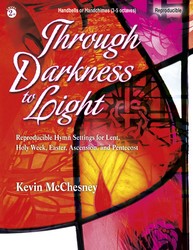- |
User Links
Come, Risen Lord, and Deign to be Our Guest

Come, risen Lord, and deign to be our guest
Author: G. W. Briggs (1931)Communion Songs
Published in 48 hymnals
Printable scores: PDF, MusicXMLAudio files: MIDI, Recording
Representative Text
1 Come, risen Lord, and deign to be our guest;
nay, let us be thy guests; the feast is thine;
thyself at thine own board make manifest,
in thine own sacrament of bread and wine.
2 We meet as in that upper room they met;
thou at the table, blessing, yet dost stand:
'This is my body': so thou givest yet;
faith still receives the cup as from thy hand.
3 One body we, one body who partake,
one church united in communion blessed;
one name we bear, one bread of life we break,
with all thy saints on earth and saints at rest.
4 One with each other, Lord, for one in thee,
who art one Saviour and one living Head;
then open thou our eyes, that we may see;
be known to us in breaking of the bread.
Source: CPWI Hymnal #578
Author: G. W. Briggs
George Wallace Briggs is a Canon of Worcester Cathedral and one of the most distinguished British hymn writers and hymnologists of today. Six of his hymns appear in the Episcopal Hymnal of 1940 (American). Another hymn on the Bible entitled "Word of the living God" was written for the 25th Anniversary of the British Bible Reading Fellowship and was sung in Westminster Abbey on June 5, 1947. It has been widely used since that time. Canon Briggs is a leading member of the Hymn Society of Great Britain and Ireland. He is also the composer of several hymn times, six of which have appeared in British hymnals. In addition to his work as a clergy man of the Church of England and an hymnologist, he has interest himself actively in the field of reli… Go to person page >Text Information
Related Texts
| First Line: | Come, risen Lord, and deign to be our guest |
| Title: | Come, Risen Lord, and Deign to be Our Guest |
| Author: | G. W. Briggs (1931) |
| Meter: | 10.10.10.10 |
| Language: | English |
| Copyright: | By permission of Oxford University Press |
| Liturgical Use: | Communion Songs |
Notes
Scripture References:
st. 1 = Luke 24:28-31
st. 2 = Luke 22:12ff, 1 Cor. 11:23-26
st. 3 = 1 Cor. 10:16-17
st. 4 = Luke 24:35, 1 Cor. 12:27
This fine text celebrates the presence of Christ in the Lord's Supper. Stanzas 1 and 4 allude to the part of the Emmaus story (Luke 24:28-35) in which the two disciples invite Jesus to be their guest, but then Jesus becomes their host. Stanza 2 focuses on our partaking of the sacrament and stanzas 3 and 4 on the oneness we share with all believers in this world and in heaven.
Originally written as "Come, risen Lord, and deign to be our guest," the text by George W. Briggs (b. Kirkby,Nottingham County, England, 1875; d. Hindhead, Surrey, England, 1959) was first published in the original edition of the British hymnbook Songs of Praise (1925). Briggs, however, regretted a change suggested by Percy Dearmer (PHH 595), editor of that hymnal–from "thine own sacrament" to "this our sacrament" in stanza I-so he later published the text in its original form in his own Songs of Faith (1945). The Psalter Hymnal text is slightly altered from the revision published in Hymns for Today's Church (1982).
Educated at Emmanuel College, Cambridge, Briggs was a well-known twentieth-century hymn writer. A clergyman in the Church of England, he served a number of parishes and was a chaplain in the Royal Navy. He was especially interested in promoting meaningful worship in the British schools and consequently wrote Prayers and Hymns for Use in Schools (1927) and Prayers and Hymns for Junior Schools (1933). Briggs was a founding member of the Hymn Society of Great Britain and Ireland.
Liturgical Use:
Lord's Supper services-fits well as a congregational song either before the sacrament or during distribution of the bread and wine; also makes a fine choir anthem, preferably unaccompanied, during the sacrament.
--Psalter Hymnal Handbook, 1987


 My Starred Hymns
My Starred Hymns




